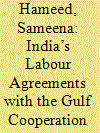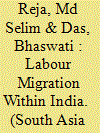| Srl | Item |
| 1 |
ID:
175475


|
|
|
|
|
| Summary/Abstract |
Although much has been written about China’s Belt and Road Initiative (BRI), so far little attention has been paid to how Chinese investment is affecting workers in BRI-targeted countries. To explore this dimension of global China, this paper examines the labor rights situation at Chinese-owned construction sites in Sihanoukville, a city on the Cambodian coast that in recent years has been described as embodying the worst excesses of Chinese foreign investment. Based on extensive interviews with Chinese and Cambodian workers, this paper argues that while Chinese-owned construction sites in Cambodia are grounded in a labor regime as exploitative as those in mainland China, workers’ agency in the former case is further undermined by their employers’ adoption of a policy of labor force dualism that draws boundaries between Chinese and Cambodian workers.
|
|
|
|
|
|
|
|
|
|
|
|
|
|
|
|
| 2 |
ID:
183141


|
|
|
|
|
| Summary/Abstract |
Despite the Indian government's proactive initiatives and reforms in the labour laws in the host countries, the welfare of Indian workers in the Gulf Cooperation Council (GCC) countries remains compromised. The Indian workers continue to face exploitation, often left stranded or forced to return home penniless. In line with best global practices, India’s Bilateral Labour Agreements (BLAs) and Memorandum of Understanding (MoUs) with all the GCC countries need to make specific reference to the host countries' labour laws and facilitate bilateral coordination in the governance of the full migration cycle. Special focus is needed in the construction sector, where a vast majority of low-skilled Indian workers are employed. The article examines the effectiveness of India’s BLAs and MoUs with the GCC countries in protecting the low-skilled Indian workers in the region.
|
|
|
|
|
|
|
|
|
|
|
|
|
|
|
|
| 3 |
ID:
166880


|
|
|
|
|
| Summary/Abstract |
Large-scale interstate labour migration within India is facilitated by the freedom of movement for citizens within this huge nation state. However, such internal labour migration within India remains largely unstudied and offers huge scope for gaining significant new knowledge. Focusing particularly on migrant construction workers from West Bengal moving to Kerala, this article specifically examines the motivations of these migrants and the role of social networks in the development of such migration streams. A field survey in Kerala indicates that Kerala’s Gulf connection and rapid demographic transition have resulted in significant reduction of local supplies of labour, thus attracting more migrants from other states in India due to better job opportunities, higher wages and good payment systems. Networks within migrant groups, especially friends’ contacts, are found to be the strongest factor in supporting this migration process.
|
|
|
|
|
|
|
|
|
|
|
|
|
|
|
|
| 4 |
ID:
189502


|
|
|
|
|
| Summary/Abstract |
Migrant construction workers are among the most vulnerable working populations in China as they are prone to facing the problem of wage arrears under the multi-tier subcontracting system. Based on ethnographic research of migrant construction workers in Tianjin, Shenzhen, Nanchang and Shaoguan, we examine workers’ divergent responses to wage arrears. While extant literature focuses on the positive role of informal networks in facilitating collective action, our findings indicate that the network structure between labour subcontractors and migrant workers plays a key role in enabling or constraining labour protests. We identify two network structures: the satellite network – characterized by arm's-length relationships between subcontractors and clusters of workers; and the spider-web network – characterized by strong relationships between subcontractors and their workers. We found that workers in satellite networks were prone to stage protests over wage arrears, but those in spider-web networks never held collective actions when facing the same problem. We argue that strong guanxi is a double-edged sword for the mobilization of labour protests and that workers’ responses to wage arrears are mediated through the network structure. Future studies may further scrutinize the role of a social network and its operating mechanisms in shaping workers’ working conditions and labour politics.
|
|
|
|
|
|
|
|
|
|
|
|
|
|
|
|